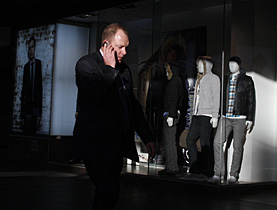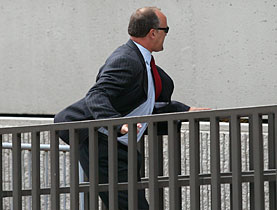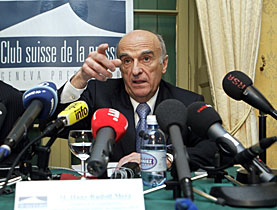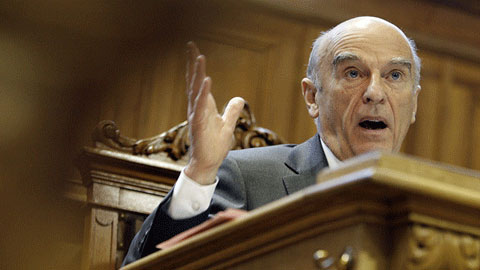Spotlight falls on shadier tax evasion scams

The murky and sophisticated world of tax avoidance has been glimpsed in the details of a treaty to turn over UBS bank clients to the United States authorities.
UBS clients who used sham shell companies, disposable mobile telephones and credit cards to funnel cash into Switzerland will also come under the scrutiny of the Internal Revenue Service (IRS).
The Swiss government agreed a deal with the US authorities in August to hand over the names of 4,450 UBS clients following a confession from the bank that some staff had actively helped US citizens evade taxes.
Details of which names would be disclosed were kept under wraps until the end of a recent US tax amnesty.
The Swiss justice ministry on Tuesday said the main group of targeted accounts contained SFr1 million (nearly $1 million), but the threshold would be lowered to SFr250,000 if proof of fraud could be produced.
IRS Commissioner Doug Shulman said the criteria were aimed at accounts that were the “largest, hardest to find, and had the most egregious behaviour”.
A prime example, covered by the treaty, would be indirect ownership of accounts. In other words, clients who hid their identity behind overseas trusts, corporations or foundations – sometimes fronted by third parties – that sifted assets into Swiss bank accounts.
“Utterly pessimistic”
Extra layers of protection could include the use of disposable mobile telephones to avoid being traced and withdrawing money from undeclared accounts using credit cards issued in that country.
Swiss tax lawyer Paolo Bernasconi told Le Temps newspaper that a profusion of offshore accounts were set up by Swiss banks to outflank the introduction of the European Union Savings Directive in 2005.
By filtering assets into Switzerland through such an operation in Panama, for example, the client would escape having part of their interest earnings creamed off by the bank to be passed on to the EU country of their domicile.
Breaking down this system would have profound effects on the Swiss financial centre – a “debacle”, as Bernasconi put it. “This time, there are reasons for us to be utterly pessimistic,” he told Le Temps.
False dawn?
The IRS claimed a massive victory in the fight against tax fraud when 14,700 people came forward during the amnesty. But US tax lawyer Asher Rubinstein firmly believes that most of them are small fry in terms of assets.
New York legal firm Rubinstein & Rubinstein advised clients from across the financial spectrum. But few of those with assets of over SFr10 million – the most likely group to employ the offshore filter account strategy – decided to come clean, even in the dying days of the amnesty that witnessed a sudden surge of applicants.
“If a US taxpayer sitting on $100 million came to a decision that he did not want to hand over half of his assets [in backdated tax payments], I don’t think he would have changed his mind in the waning days of the programme,” Rubinstein told swissinfo.ch. “Some people may have caught religion and come forward but many just could not stomach losing such a large chunk of their account.”
Rubinstein added the caveat that UBS clients were more likely to have been spooked than those with accounts at other banks and that the revelation of disclosure details on Tuesday could prompt more to come forward. But he remains convinced that many big league tax dodgers are still in hiding.
“This may be influenced by a reliance on past secrecy, burying their heads in the sand or just the hope that, despite the events of 2009, they will still remain secret,” he said.
Rubinstein warned that even the most sophisticated methods of disguising identities and salting away undeclared cash could prove paper thin given the level of cooperation between the Swiss and US authorities.
“All codes are breakable and recent events [such as the UBS investigation and the Swiss-US disclosure deal] have shown that these holding agencies are extremely vulnerable,” he said.
Matthew Allen, swissinfo.ch
In August the Swiss government agreed to name 4,450 UBS clients to the US authorities. This followed an IRS investigation that found some bank employees had actively aided US tax evaders.
UBS is obliged to hand over the details to the Swiss government which will then pass the names on to the US authorities.
The criteria for selecting names includes any US-domiciled client who held undeclared accounts exceeding SFr1 million at any point between 2001 and 2008, where there is suspicion of “tax fraud and the like”.
If fraud can be proven, this threshold would be lowered to SFr250,000. This includes people who transferred funds from a trust, corporation or foundation not bearing their name.
US persons are also at risk of having their details disclosed if their account had unreported earnings of an average of SFr100,000 in interest and dividends in three years within the time range.
The first 500 names will be handed over by the end of this month and the remainder by August of next year.
Individuals on the list would have 30 days to lodge an appeal with the Federal Administrative Court.

In compliance with the JTI standards
More: SWI swissinfo.ch certified by the Journalism Trust Initiative





You can find an overview of ongoing debates with our journalists here . Please join us!
If you want to start a conversation about a topic raised in this article or want to report factual errors, email us at english@swissinfo.ch.